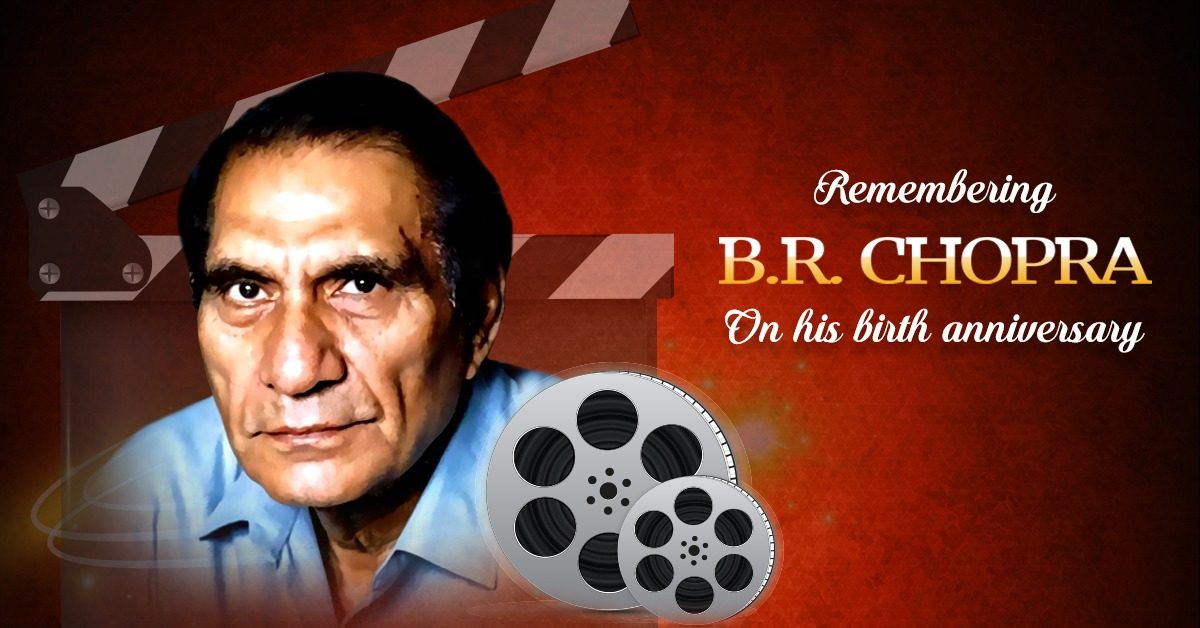B. R. Chopra will always be remembered for brightening up our Sunday mornings with the unforgettable musical-mythological drama that would start ringing in our minds synchronously across India. While the entire family is sitting in front of the television, the streets are empty, busy markets look abandoned in awe of the current episode.
These were the days without OTT channels, iPods, mobile data packs, YouTube, and Social media platforms, where entertainment reached home only in that electronic box. The iconic series Mahabharat gave us more than entertainment, it nourished our souls with great learnings from great beings that walked on earth.
That is exactly what separates other directors from B. R. Chopra, where he never misses out to pass a message that is instrumental in bringing about a change. The millennial generation has matured passing their days watching his movies and acculturated themselves with his rich adaptations from the past and present life and traditions.
Honored with the title of Padma Bhushan, which is the third-highest civilian award in the Republic of India, he is one of the pioneers of the film industry in the 20th century. B. R. Chopra took his films from black and white to Eastman color technology of motion picture production and in both the ages received countless awards and nominations for his contribution.
Listen to B. R. Chopra’s interview available exclusively from Saregama to hear his narratives in his own words. Born in 1914, Baldev Raj Chopra took the road less traveled in his early life when a career in the film industry was completely insignificant and unrecognized compared to the times now. Coming from undivided Punjab, before the partition, he would write for Lahore’s Cine Herald. Later when he moved to the land which is the birthplace of ‘Bollywood’, earlier known as Bombay and now Mumbai, he gained his identity as a director for the first time.
Baldev was supported by his family, so much so that they willingly invested all their capital for his first film, Karwat in 1949. Unfortunately, this movie did not perform well at the box office leaving them bankrupt due to which he had to turn back to journalism. However, this incident did not douse the fire of passion for his ambitions and endeavors in filmmaking.
B. R. Chopra started collecting funds for his next project Afsana released in 1951 which was much appreciated and loved for Ashok Kumar’s double role. This success gave him all the power and passion he needed to film with Meena Kumari as the lead actress for Chandni Chawk in 1954 and Ek Hi Raasta in 1956, which also was the first movie under his own production house ‘B. R. Films’.
The very next creation was a golden jubilee success at the box office in 1957, Naya Daur featuring the megastar Dilip Kumar with unforgettable songs like ‘Uden Jab Jab Zulfen Teri’, ‘Maang Ke Saath Tumhara’, and ‘Yeh Desh Hai Veer Jawanon Ka’
The special factor in every Chopra film would be the message encapsulated in entertainment and humor, ranging from different social issues like the remarriage of a widow to the life of sex workers, from the adversities of partition to supporting inter-faith love marriages, from life after marriage to thriller movies based on suspense, every movie was a masterpiece.
The movie Sadhana based on a life of a sex worker played by Vyjayanthimala enthralled the audience with its song, ‘Aaj Kyon Humse Parda’ by Mohammed Rafi. Across different genres of films, Dhund was thriller-suspense based, Karm had the flavors of music and drama, Pati Patni Aur Woh was a light comedy, on the other hand, Insaf Ka Tarazu was based on justice, Nikaah celebrated the Muslim traditions, and Awam was based on politics.
B. R. Chopra was instrumental in his son’s successful career by motivating, training, and nurturing his talents in the process of filmmaking. Ravi Chopra was a great support to his father for his television series like Mahabharat and many others that created history in the twentieth century.
Ravi Chopra’s directions for numerous films were also produced by his father. He made his directorial debut with Zameer that starred the superstar Amitabh Bachchan. The Burning Train movie was a very unique concept and distinctive cinematography was exhibited. Aaj Ki Awaaz, Mazdoor, Baghban, Baabul, and Bhoothnath are a few others where he stood as a producer and showed his immense faith and support in his son’s expertise.
The lineage of the Chopras originated after he caved the path himself amidst the struggles. After him, his brother Yash Chopra, who was eighteen years younger than him, also manifested himself as a successful Director & Producer. On his arrival in Mumbai in 1953, he joined his brother’s film unit for the mega-blockbuster movie Shole and started to gain experience.
The duo worked under the same banner for about two decades from Shole (1953) to Aadmi Aur Insaan (1970), where Yash Chopra was the chief assistant director for many of the movies after which he also accomplished directorship of several films and received numerous awards and accolades.
Yash Chopra married an Indian playback singer Pamela Chopra who was the daughter of an officer from the Indian Army. Actress Simi Garewal from the film industry also happens to be her cousin. She also performed well as a writer for her husband’s & son’s movies and had produced several films as well. The couple is gifted with two sons who took the legacy ahead, Aditya Chopra, a successful filmmaker who tied the knot with Rani Mukharjee, and Uday Chopra who has showcased his talent as an actor, director, screenwriter, and producer.
To cherish these memories created by the Chopra Clan listen to Saregama Carvaan’s Geetmala songs to transport yourself to this golden era or download mp3 songs available at your fingertips.

